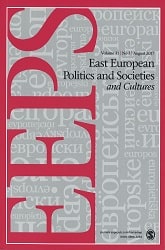The National Idea: Imperial Legacies and Post-Communist Pathways in Eastern Europe
The National Idea: Imperial Legacies and Post-Communist Pathways in Eastern Europe
Author(s): Valerie BunceSubject(s): Political history, Government/Political systems, Nationalism Studies, Transformation Period (1990 - 2010), Post-Communist Transformation, Politics and Identity
Published by: SAGE Publications Ltd
Keywords: nationalism; empire; democratization; liberal opposition; the Soviet bloc; ethnofederation;
Summary/Abstract: Why has the national idea played such a powerful role, both positive and negative, in the regime, state, and economic transitions that have taken place in post-communist Eurasia? This article emphasizes the powerful but variable effects of imperial rule in this region, beginning with the Habsburgs and continuing through the more recent experiences of the Soviet bloc and the Yugoslav, Soviet, and Czechoslovak ethnofederations. The national idea, a product of very different experiences in the West, was transformed when moving eastward in the nineteenth century, largely because imperial contexts are not state contexts. The political empowerment of the national idea continued when imperial dynamics returned to the region with the rise of communism. As a result, post-communist Eastern Europe was unusually well situated to privilege nationalism in the struggles over new states and new economic and political regimes.
Journal: East European Politics and Societies
- Issue Year: 19/2005
- Issue No: 03
- Page Range: 406-442
- Page Count: 37
- Language: English
- Content File-PDF

